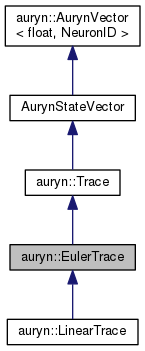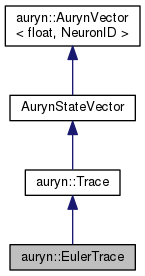 |
Auryn simulator
v0.8.1-206-gb56e451
Plastic Spiking Neural Network Simulator
|
 |
Auryn simulator
v0.8.1-206-gb56e451
Plastic Spiking Neural Network Simulator
|
Solves a set of identical linear differential equations with the Euler method. It is used to implement synaptic traces in most STDP models. More...
#include <EulerTrace.h>


Public Member Functions | |
| EulerTrace (NeuronID n, AurynFloat timeconstant) | |
| virtual | ~EulerTrace () |
| void | evolve () |
| void | set_timeconstant (AurynFloat timeconstant) |
| void | set_target (AurynStateVector *target) |
| void | follow () |
 Public Member Functions inherited from auryn::Trace Public Member Functions inherited from auryn::Trace | |
| Trace (NeuronID n, AurynFloat timeconstant) | |
| Default constructor. More... | |
| virtual | ~Trace () |
| Default destructor. More... | |
| virtual void | inc (NeuronID i) |
| Increment given trace by 1. More... | |
| virtual void | inc (SpikeContainer *sc) |
| Increment given traces by 1. More... | |
| AurynFloat | get_tau () |
| Get decay time constant. More... | |
| virtual AurynFloat | normalized_get (NeuronID i) |
| Get trace value of trace dived by tau. More... | |
| virtual AurynStateVector * | get_state_ptr () |
| Get pointer to state AurynStateVector for fast processing. More... | |
| virtual void | follow (AurynVectorFloat *v, const float rate) |
| Follow other vector. More... | |
 Public Member Functions inherited from auryn::AurynVectorFloat Public Member Functions inherited from auryn::AurynVectorFloat | |
| AurynVectorFloat (NeuronID n) | |
| Default constructor. More... | |
| ~AurynVectorFloat () | |
| Default destructor. More... | |
| virtual void | resize (NeuronID new_size) |
| resize data array to new_size More... | |
| void | scale (const float a) |
| void | saxpy (const float a, AurynVectorFloat *x) |
| void | clip (const float min, const float max) |
| void | add (const float c) |
| void | add (AurynVectorFloat *v) |
| void | sum (AurynVectorFloat *a, AurynVectorFloat *b) |
| void | sum (AurynVectorFloat *a, const float b) |
| void | mul (const float a) |
| void | mul (AurynVectorFloat *v) |
| void | diff (AurynVectorFloat *a, AurynVectorFloat *b) |
| void | diff (AurynVectorFloat *a, const float b) |
| void | diff (const float a, AurynVectorFloat *b) |
| void | follow (AurynVectorFloat *v, const float rate) |
 Public Member Functions inherited from auryn::AurynVector< float, NeuronID > Public Member Functions inherited from auryn::AurynVector< float, NeuronID > | |
| AurynVector (NeuronID n) | |
| Default constructor. More... | |
| AurynVector (AurynVector *vec) | |
| Copy constructor. More... | |
| virtual | ~AurynVector () |
| Default destructor. More... | |
| void | copy (AurynVector *v) |
| Copies vector v. More... | |
| float | get (NeuronID i) |
| Gets element i from vector. More... | |
| float * | ptr (NeuronID i=0) |
| Gets pointer to element i from vector. More... | |
| void | set (NeuronID i, float value) |
| Sets element i in vector to value. More... | |
| void | set_all (const float v) |
| Set all elements to value v. More... | |
| void | set_zero () |
| Set all elements to zero. More... | |
| void | scale (const float a) |
| Scales all vector elements by a. More... | |
| void | add (const float c) |
| Adds constant c to each vector element. More... | |
| void | add (AurynVector *v) |
| Adds a vector v to the vector. More... | |
| void | add_specific (const NeuronID i, const float c) |
| Adds the value c to specific vector element i. More... | |
| void | mul_specific (const NeuronID i, const float c) |
| Multiply to specific vector element with data index i with the constant c. More... | |
| void | sub (const float c) |
| Subtract constant c to each vector element. More... | |
| void | sub (AurynVector *v) |
| Elementwise subtraction. More... | |
| void | mul (const float a) |
| Multiply all vector elements by constant. More... | |
| void | mul (AurynVector *v) |
| Element-wise vector multiply. More... | |
| void | div (const float a) |
| Element-wise division. More... | |
| void | div (AurynVector *v) |
| Element-wise vector division. More... | |
| void | div (AurynVector *a, AurynVector *b) |
| Element-wise vector division which stores the result in this. More... | |
| void | saxpy (const float a, AurynVector *x) |
| SAXPY operation as in GSL. More... | |
| void | follow (AurynVector< float, NeuronID > *v, const float rate) |
| Follows target vector v with rate. More... | |
| void | follow_scalar (const float a, const float rate) |
| Like follow but with a scalar target value a. More... | |
| void | elementwise_max (AurynVector *v1, AurynVector *v2) |
| Elementwise max operation. More... | |
| void | elementwise_max (AurynVector *v1) |
| Elementwise max operation with another vector. More... | |
| void | pow (const unsigned int n) |
| Takes each element to the n-th power. More... | |
| void | fast_exp () |
| Computes an approximation of exp(x) for each vector element. More... | |
| void | exp () |
| Computes exp(x) for each vector element. More... | |
| void | sigmoid (AurynVector *x, const float beta, const float thr) |
| Computes sigmoid(beta*(x-thr)) for each vector element and stores result in this instance. More... | |
| void | sqrt () |
| Takes the square root of each element. More... | |
| void | neg () |
| Flips the sign of all elements. More... | |
| void | inv () |
| Computes 1./x of each element. More... | |
| void | sum (AurynVector *a, AurynVector *b) |
| Computes the sum a+b and stores the result in this instance. More... | |
| void | sum (AurynVector *a, const float b) |
| Computes the sum a+b and stores the result in this instance. More... | |
| void | diff (AurynVector *a, AurynVector *b) |
| Computes the difference a-b and stores the result in this instance. More... | |
| void | diff (AurynVector *a, const float b) |
| Computes the difference a-b and stores the result in this instance. More... | |
| void | diff (const float a, AurynVector *b) |
| Computes the difference a-b and stores the result in this instance. More... | |
| void | sqr () |
| Squares each element. More... | |
| void | abs () |
| Takes absolute value of each element. More... | |
| void | rect () |
| Rectifies all elements. More... | |
| void | neg_rect () |
| Negatively rectifies all elements. More... | |
| void | clip (float min, float max) |
| Clips all vector elements to the range min max. More... | |
| double | var () |
| Computes the variance of the vector elements on this rank. More... | |
| double | std () |
| Computes the standard deviation of all elements on this rank. More... | |
| double | mean () |
| Computes the mean of the vector elements on this rank. More... | |
| double | element_sum () |
| Computes the sum of the vector elements. More... | |
| double | l1norm () |
| Computes the l1 norm of the vector. More... | |
| double | l2norm () |
| Computes the l2 norm of the vector. More... | |
| double | max () |
| Returns the max of the vector elements. More... | |
| double | min () |
| Returns the min of the vector elements. More... | |
| NeuronID | nonzero () |
| Computes number of nonzero elements on this rank. More... | |
| void | zero_effective_zeros (const float epsilon=1e-3) |
| Sets all values whose absolute value is smaller than epsilon to zero. More... | |
| void | add_random_normal (AurynState mean=0.0, AurynState sigma=1.0, unsigned int seed=8721) |
| void | set_random_normal (AurynState mean=0.0, AurynState sigma=1.0, unsigned int seed=8721) |
| void | set_random (unsigned int seed=0) |
| Initializes vector elements with Gaussian of unit varince and a seed derived from system time if no seed or seed of 0 is given. More... | |
| bool | any () |
| Returns true if any element is nonzero. More... | |
| bool | any (float eps) |
| Returns true if any element is nonzero. More... | |
| void | print () |
| Print vector elements to stdout for debugging. More... | |
| void | write_to_file (std::string filename) |
| Print vector elements to a text file for debugging. More... | |
Additional Inherited Members | |
 Public Attributes inherited from auryn::AurynVector< float, NeuronID > Public Attributes inherited from auryn::AurynVector< float, NeuronID > | |
| NeuronID | size |
| Size of the vector. More... | |
| float * | data |
| Pointer to the array housing the data. More... | |
 Protected Member Functions inherited from auryn::AurynVector< float, NeuronID > Protected Member Functions inherited from auryn::AurynVector< float, NeuronID > | |
| void | check_size (NeuronID x) |
| Checks if argument is larger than size and throws and exception if so. More... | |
| void | check_size (AurynVector *v) |
| Checks if vector size matches to this instance. More... | |
| void | allocate (const NeuronID n) |
| Implements aligned memory allocation. More... | |
| void | freebuf () |
| float | fast_exp256 (float x) |
| Computes approximation of exp(x) via fast series approximation up to n=256. More... | |
 Protected Attributes inherited from auryn::Trace Protected Attributes inherited from auryn::Trace | |
| AurynFloat | tau |
Solves a set of identical linear differential equations with the Euler method. It is used to implement synaptic traces in most STDP models.
This solver simultaneoulsy computes linear traces (mostly to implement synapses) using Euler's method. Another solver is readily available within the Auryn framework. The LinearTrace objects solves the same problem but using the analytic solution. This results in less updates. However - so far it turned out to be inferior in performance to the EulerTrace.
| EulerTrace::EulerTrace | ( | NeuronID | n, |
| AurynFloat | timeconstant | ||
| ) |
Default constructor
|
virtual |
Perform Euler step.
Implements auryn::Trace.
Reimplemented in auryn::LinearTrace.

|
virtual |
Perform Euler step but follow target vector instead of zero-decay
Implements auryn::Trace.

|
virtual |
set the target vector for follow operation
Implements auryn::Trace.

|
virtual |
Set the time constant of the trace
Reimplemented from auryn::Trace.

 1.8.13
1.8.13